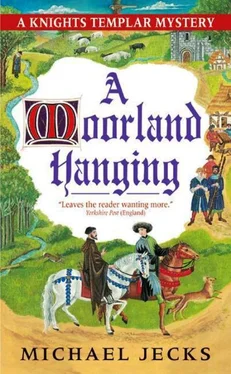“Sir William was there too?”
“Oh yes, and like his son Robert he was as arrogant as a young knight can be. I think it was his first war, though he’s been on many a raid since. But he was a knight, and wouldn’t speak to me. I was just there to obey orders and nothing else. We were there under de Tany for ages. I remember we marched in Maytime, early in the month, and had to go to Neston, in the Dee estuary. I was a crossbowman, and I was one of the group put on the fleet of over sixty ships called from the Cinque ports. Many of us bowmen were there on the ships to serve as marines when we arrived in Anglesey. We took the island and built a bridge over the Menai Strait so that we could attack through to Bangor, but then that was it. By the end of September we were ready, but we had to wait until we had an instruction from the King to carry on, for we were to throw the enemy into confusion by diverting his armies just when the King’s own men started a new attack.
“It went well. The King and the Earl of Lincoln moved up the Clwyd Valley, Earl Warenne advanced along the middle Dee, and Reginald de Grey went on from Hope. The Welsh had no chance against such forces, and the whole affair should have been finished quickly, but Archbishop Pecham decided to try to stop the killing. He mediated for some time and held up the attack – a stupid waste of time. It was obvious that the Welsh were merely taking the opportunity to regroup their men for more fighting.
“Meanwhile, we in Anglesey were stuck with nothing to do. It was miserable, with no decent camp and too many men in a small area. Men fell ill, and we were all fretful and bored. We just wanted to get on with it and push the Welsh back. Well,” he glanced up at his attentive audience, “that was why Sir William did it, I think. Boredom!”
A faraway look came to his face as he continued, every now and then his hand rising to his cheek to scratch at an insect bite. “You have to understand, first, that until then the soldiers had been well enough behaved. We had attacked the island and won it, we had set up camp as ordered, and we had built the bridge as we had been told. But the tedium of just sitting out there with nothing to do was dreadful! We knew that at any time we could be thrown over the bridge to meet the Welsh, and that was worrying. Those madmen with their long knives are vicious warriors. In the heat, and with more and more men falling ill from fevers and then dying, fights began to break out – little disputes flaring like charcoal when the bellows blow. Normally they would have been forgotten, but there they became reason to kill. And for a young knight seeking glory and wealth, it was maddening.
“It was November when we began to move. We had waited there for months, and I think de Tany was as keen as the rest of us to get moving, so we crossed over the bridge and into Snowdonia. Our leader thought he could make a decisive attack which would throw the Welsh into disorder and end the war. It’s been said de Tany wanted to ruin the peace negotiations – I don’t know, he might have – but all I can say is that we all wanted to go by then.
“At first, things went well. We rode out into the country, but the main host got entangled in a fight with Welshmen. When this happened, I was out on the flank with Sir William, and he ordered me to join him. We thought it was to attack the rear of the Welsh, but no, he took us round behind and then on into the country.”
Now his eyes rose to meet Baldwin’s. “He had heard of a nunnery some miles away – I still don’t know the name of it – where the nuns had gold and jewels. That was his aim, not to fight in some vainglorious battle, but to make a profit from a war he thought foolish. He took us there and we attacked it. They had no chance. There were some hundred and fifty of us, and the nuns only had twenty-odd men to protect them. They were all killed, including the women, but not of course before they were raped.” His voice was cold and bitter as his face hardened. “And Sir William was the first, taking two women before he let his soldiers in.”
There was silence for a moment, then Baldwin stirred. “And you?” he asked softly.
“Me? I was there, but I didn’t rape or kill or steal. How could any man be so barbaric toward women who have dedicated themselves to God? These weren’t tavern sluts, they were holy. I couldn’t touch them if I’d wanted to. No, I turned my horse for Anglesey, and a good thing too. If I hadn’t, I might have said something to Sir William, and that would have earned me a slow death and no honor.
“No, I returned, but by then the battle was lost and de Tany dead, drowned in the Menai Strait. The men had been routed, and I had a hard time of it winning my way back to the camp. There seemed little point in telling of Sir William and his exploits. The situation was bad enough, and most men were talking about getting back on to the ships and sailing for Rhuddlan or Neston, but the ships refused to take anyone. I think they were scared of what the King might say and do to them. So we were stuck there, until we were lucky enough to have Otto de Grandison arrive to take over. And that was when I had my shock, for suddenly, here was Sir William again, but now apparently covered in glory and wealthy to boot.
“He had taken all he could carry, him and his men, and run away, riding as fast as they could to avoid the Welsh, for I suppose by now they had heard of the defeat of the army. So it was Sir William who brought news of the battle to the King, and it was Sir William who was rewarded by the King for acting so bravely as a messenger!”
Falling silent, he frowned darkly at the water in the stream. “Of course, I was only a poor trooper, a mounted crossbowman. I could not accuse a great man like Sir William of outlawry. If I had, I would likely have been killed for my presumption. So I tried to forget it. I was with the soldiers when Otto de Grandison led us over the Strait again, this time successfully, and was with his army when it closed in on Snowdonia and took Caernarvon and Harlech. There was no great booty, but at least I came out of it alive, though bitter to see how easily a knight could win renown, wealth, and the King’s favor. Afterward, I travelled around the country. The war had left me feeling unsettled, and it was some time before I recalled what other men in Sir William’s retinue had said of tin mining and how a man could live on the moors free of anyone, making his own money from his work. The idea sounded good to me, so I came here.”
Simon puffed out his cheeks as he sighed. The tinner’s story was all too common, he knew. He had met other soldiers and seen their bitterness at how they had been betrayed, their disgust with the rewards given to some who least deserved honor, while others who should have been feted were forgotten. It was the way of war. “And it was definitely Sir William who led the attack on the nunnery?” he asked.
Thomas Smyth grunted assent without looking up.
“Tell me, Thomas,” said Baldwin, “when did you mention this to Sir William?”
Now the tinner looked up with a smile playing at his lips. “How did you guess that?” he asked. “No matter! I told him on the day Peter was killed – when I saw Sir William.”
“What, when you saw him that morning at Beauscyr?” asked Baldwin, suddenly intense.
“No, that evening, when he came here.”
“What did you say to him?”
“I had asked him to come to my hall to discuss what I should do about the tin on his land,” said Thomas, and gave a quick grin. “I think you know what I mean. He brought money with him, and he thought that was all… but then as he was about to leave, I told him that I remembered the convent, and he was quiet, like a dog is quiet when it sees a peril and crouches ready to spring. I told him all that I have just told you, all about the campaign, how he took men away from the battle to further his own fortune, and how he gained favor with the King. I think he was shocked.”
Читать дальше












